Relationship between Narcissism and Self-Efficacy
VerifiedAdded on 2022/12/14
|7
|1365
|342
AI Summary
This research study examines the relationship between narcissism and self-efficacy in academic and workplace performance. It explores the impact of narcissism on emotions and self-perception. The study identifies the correlation between different types of narcissism and emotional dysregulation, self-esteem, and career success. The findings contribute to understanding the effects of narcissism on individuals' academic and career-related self-efficacy.
Contribute Materials
Your contribution can guide someone’s learning journey. Share your
documents today.
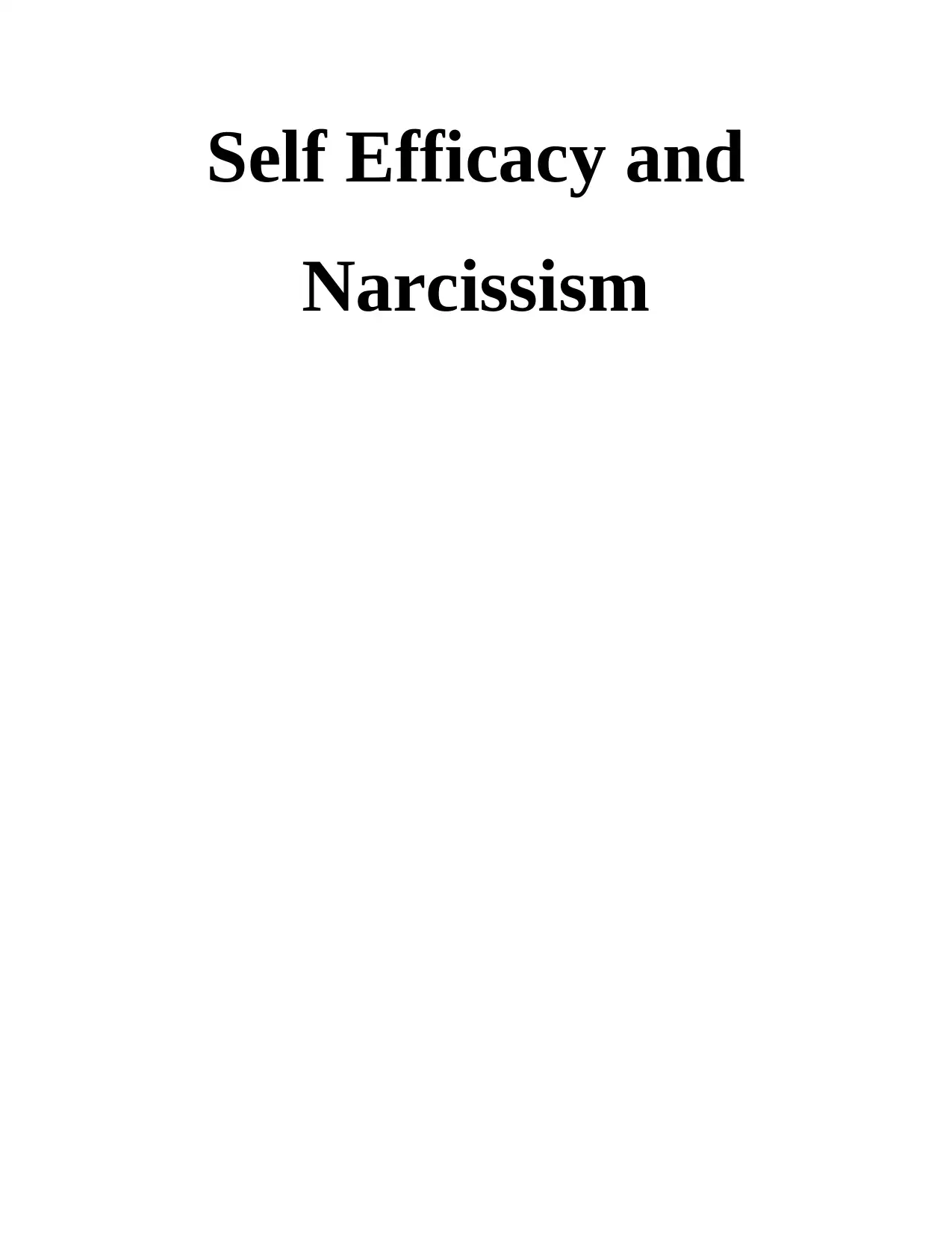
Self Efficacy and
Narcissism
Narcissism
Secure Best Marks with AI Grader
Need help grading? Try our AI Grader for instant feedback on your assignments.
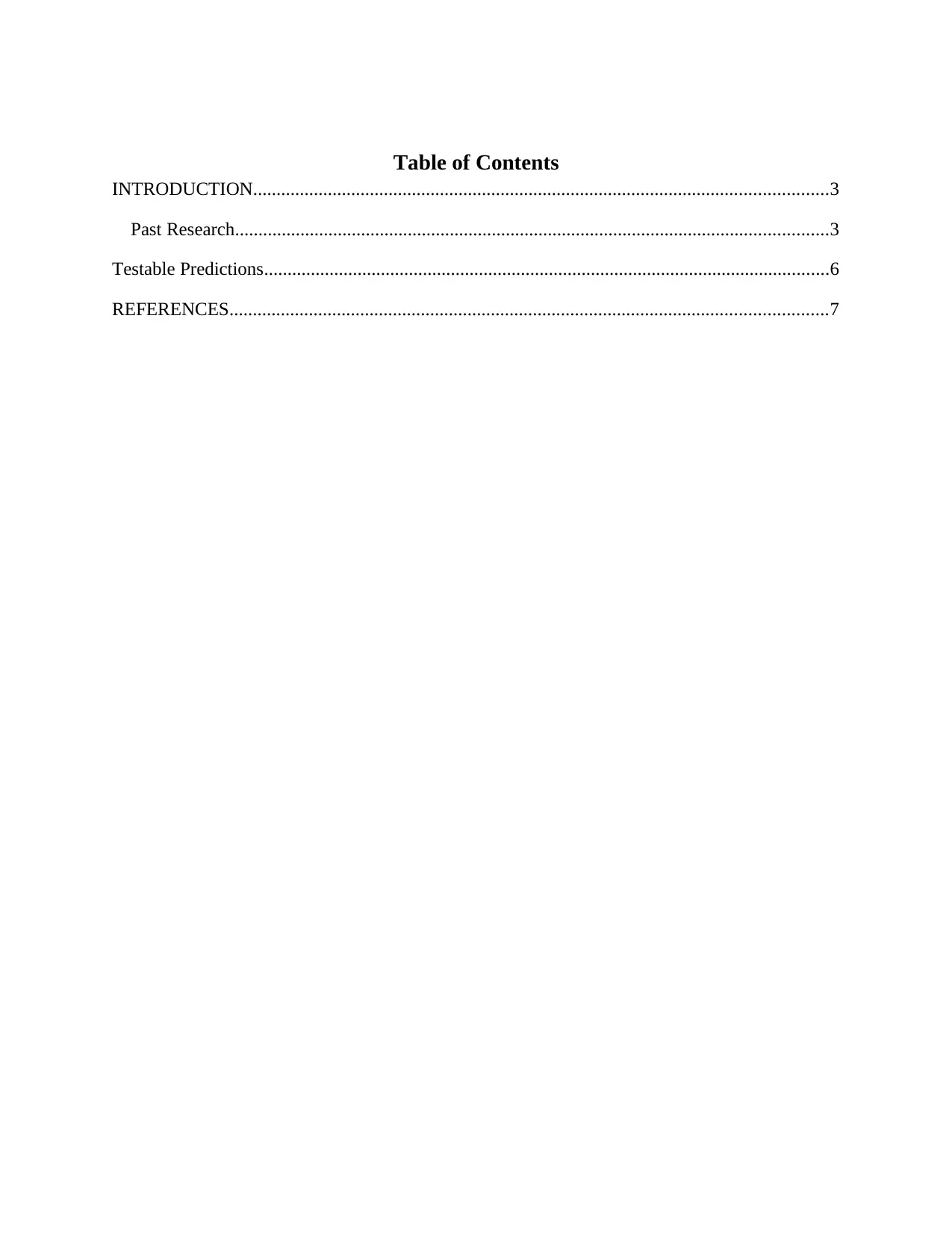
Table of Contents
INTRODUCTION...........................................................................................................................3
Past Research...............................................................................................................................3
Testable Predictions.........................................................................................................................6
REFERENCES................................................................................................................................7
INTRODUCTION...........................................................................................................................3
Past Research...............................................................................................................................3
Testable Predictions.........................................................................................................................6
REFERENCES................................................................................................................................7
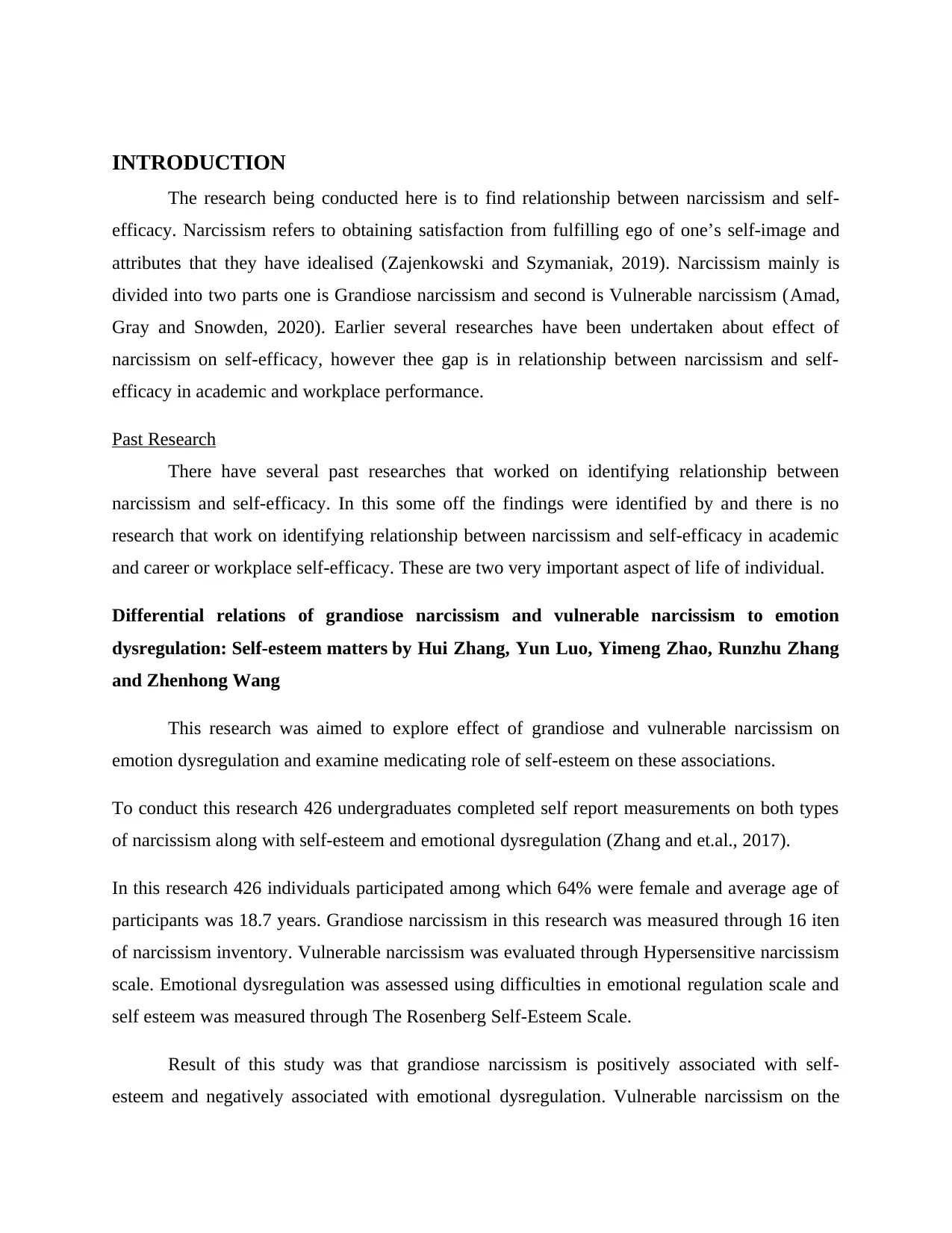
INTRODUCTION
The research being conducted here is to find relationship between narcissism and self-
efficacy. Narcissism refers to obtaining satisfaction from fulfilling ego of one’s self-image and
attributes that they have idealised (Zajenkowski and Szymaniak, 2019). Narcissism mainly is
divided into two parts one is Grandiose narcissism and second is Vulnerable narcissism (Amad,
Gray and Snowden, 2020). Earlier several researches have been undertaken about effect of
narcissism on self-efficacy, however thee gap is in relationship between narcissism and self-
efficacy in academic and workplace performance.
Past Research
There have several past researches that worked on identifying relationship between
narcissism and self-efficacy. In this some off the findings were identified by and there is no
research that work on identifying relationship between narcissism and self-efficacy in academic
and career or workplace self-efficacy. These are two very important aspect of life of individual.
Differential relations of grandiose narcissism and vulnerable narcissism to emotion
dysregulation: Self-esteem matters by Hui Zhang, Yun Luo, Yimeng Zhao, Runzhu Zhang
and Zhenhong Wang
This research was aimed to explore effect of grandiose and vulnerable narcissism on
emotion dysregulation and examine medicating role of self-esteem on these associations.
To conduct this research 426 undergraduates completed self report measurements on both types
of narcissism along with self-esteem and emotional dysregulation (Zhang and et.al., 2017).
In this research 426 individuals participated among which 64% were female and average age of
participants was 18.7 years. Grandiose narcissism in this research was measured through 16 iten
of narcissism inventory. Vulnerable narcissism was evaluated through Hypersensitive narcissism
scale. Emotional dysregulation was assessed using difficulties in emotional regulation scale and
self esteem was measured through The Rosenberg Self-Esteem Scale.
Result of this study was that grandiose narcissism is positively associated with self-
esteem and negatively associated with emotional dysregulation. Vulnerable narcissism on the
The research being conducted here is to find relationship between narcissism and self-
efficacy. Narcissism refers to obtaining satisfaction from fulfilling ego of one’s self-image and
attributes that they have idealised (Zajenkowski and Szymaniak, 2019). Narcissism mainly is
divided into two parts one is Grandiose narcissism and second is Vulnerable narcissism (Amad,
Gray and Snowden, 2020). Earlier several researches have been undertaken about effect of
narcissism on self-efficacy, however thee gap is in relationship between narcissism and self-
efficacy in academic and workplace performance.
Past Research
There have several past researches that worked on identifying relationship between
narcissism and self-efficacy. In this some off the findings were identified by and there is no
research that work on identifying relationship between narcissism and self-efficacy in academic
and career or workplace self-efficacy. These are two very important aspect of life of individual.
Differential relations of grandiose narcissism and vulnerable narcissism to emotion
dysregulation: Self-esteem matters by Hui Zhang, Yun Luo, Yimeng Zhao, Runzhu Zhang
and Zhenhong Wang
This research was aimed to explore effect of grandiose and vulnerable narcissism on
emotion dysregulation and examine medicating role of self-esteem on these associations.
To conduct this research 426 undergraduates completed self report measurements on both types
of narcissism along with self-esteem and emotional dysregulation (Zhang and et.al., 2017).
In this research 426 individuals participated among which 64% were female and average age of
participants was 18.7 years. Grandiose narcissism in this research was measured through 16 iten
of narcissism inventory. Vulnerable narcissism was evaluated through Hypersensitive narcissism
scale. Emotional dysregulation was assessed using difficulties in emotional regulation scale and
self esteem was measured through The Rosenberg Self-Esteem Scale.
Result of this study was that grandiose narcissism is positively associated with self-
esteem and negatively associated with emotional dysregulation. Vulnerable narcissism on the
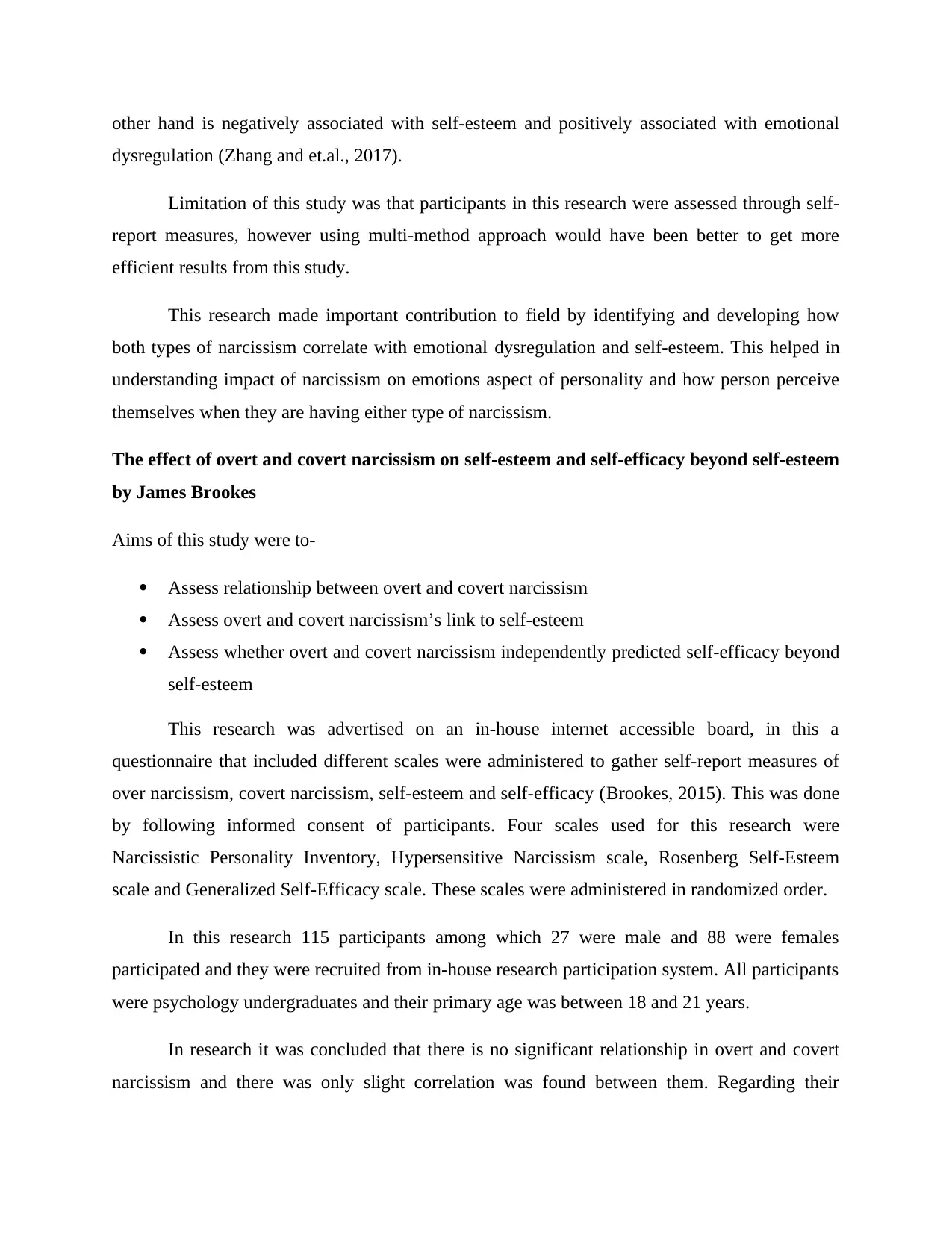
other hand is negatively associated with self-esteem and positively associated with emotional
dysregulation (Zhang and et.al., 2017).
Limitation of this study was that participants in this research were assessed through self-
report measures, however using multi-method approach would have been better to get more
efficient results from this study.
This research made important contribution to field by identifying and developing how
both types of narcissism correlate with emotional dysregulation and self-esteem. This helped in
understanding impact of narcissism on emotions aspect of personality and how person perceive
themselves when they are having either type of narcissism.
The effect of overt and covert narcissism on self-esteem and self-efficacy beyond self-esteem
by James Brookes
Aims of this study were to-
Assess relationship between overt and covert narcissism
Assess overt and covert narcissism’s link to self-esteem
Assess whether overt and covert narcissism independently predicted self-efficacy beyond
self-esteem
This research was advertised on an in-house internet accessible board, in this a
questionnaire that included different scales were administered to gather self-report measures of
over narcissism, covert narcissism, self-esteem and self-efficacy (Brookes, 2015). This was done
by following informed consent of participants. Four scales used for this research were
Narcissistic Personality Inventory, Hypersensitive Narcissism scale, Rosenberg Self-Esteem
scale and Generalized Self-Efficacy scale. These scales were administered in randomized order.
In this research 115 participants among which 27 were male and 88 were females
participated and they were recruited from in-house research participation system. All participants
were psychology undergraduates and their primary age was between 18 and 21 years.
In research it was concluded that there is no significant relationship in overt and covert
narcissism and there was only slight correlation was found between them. Regarding their
dysregulation (Zhang and et.al., 2017).
Limitation of this study was that participants in this research were assessed through self-
report measures, however using multi-method approach would have been better to get more
efficient results from this study.
This research made important contribution to field by identifying and developing how
both types of narcissism correlate with emotional dysregulation and self-esteem. This helped in
understanding impact of narcissism on emotions aspect of personality and how person perceive
themselves when they are having either type of narcissism.
The effect of overt and covert narcissism on self-esteem and self-efficacy beyond self-esteem
by James Brookes
Aims of this study were to-
Assess relationship between overt and covert narcissism
Assess overt and covert narcissism’s link to self-esteem
Assess whether overt and covert narcissism independently predicted self-efficacy beyond
self-esteem
This research was advertised on an in-house internet accessible board, in this a
questionnaire that included different scales were administered to gather self-report measures of
over narcissism, covert narcissism, self-esteem and self-efficacy (Brookes, 2015). This was done
by following informed consent of participants. Four scales used for this research were
Narcissistic Personality Inventory, Hypersensitive Narcissism scale, Rosenberg Self-Esteem
scale and Generalized Self-Efficacy scale. These scales were administered in randomized order.
In this research 115 participants among which 27 were male and 88 were females
participated and they were recruited from in-house research participation system. All participants
were psychology undergraduates and their primary age was between 18 and 21 years.
In research it was concluded that there is no significant relationship in overt and covert
narcissism and there was only slight correlation was found between them. Regarding their
Secure Best Marks with AI Grader
Need help grading? Try our AI Grader for instant feedback on your assignments.
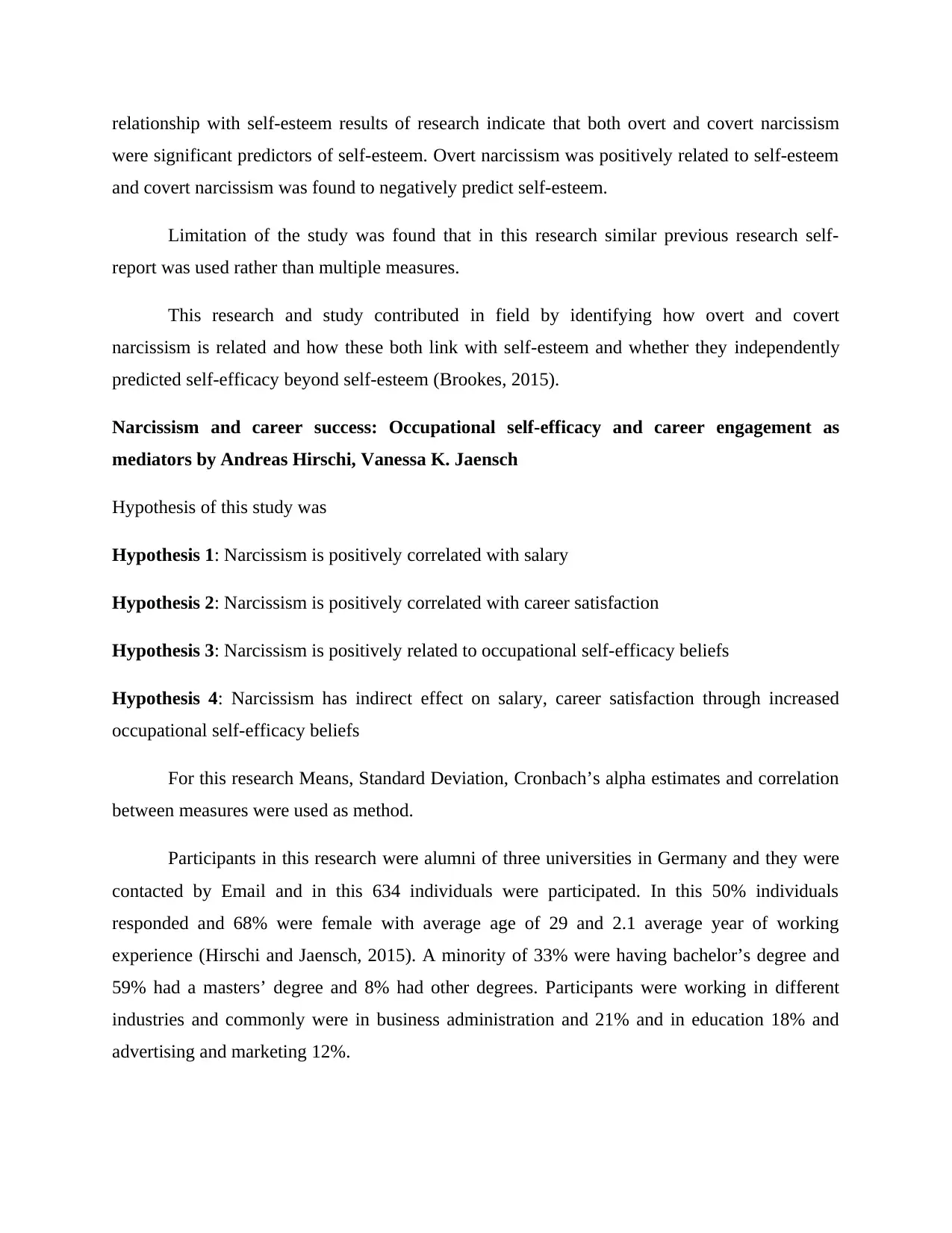
relationship with self-esteem results of research indicate that both overt and covert narcissism
were significant predictors of self-esteem. Overt narcissism was positively related to self-esteem
and covert narcissism was found to negatively predict self-esteem.
Limitation of the study was found that in this research similar previous research self-
report was used rather than multiple measures.
This research and study contributed in field by identifying how overt and covert
narcissism is related and how these both link with self-esteem and whether they independently
predicted self-efficacy beyond self-esteem (Brookes, 2015).
Narcissism and career success: Occupational self-efficacy and career engagement as
mediators by Andreas Hirschi, Vanessa K. Jaensch
Hypothesis of this study was
Hypothesis 1: Narcissism is positively correlated with salary
Hypothesis 2: Narcissism is positively correlated with career satisfaction
Hypothesis 3: Narcissism is positively related to occupational self-efficacy beliefs
Hypothesis 4: Narcissism has indirect effect on salary, career satisfaction through increased
occupational self-efficacy beliefs
For this research Means, Standard Deviation, Cronbach’s alpha estimates and correlation
between measures were used as method.
Participants in this research were alumni of three universities in Germany and they were
contacted by Email and in this 634 individuals were participated. In this 50% individuals
responded and 68% were female with average age of 29 and 2.1 average year of working
experience (Hirschi and Jaensch, 2015). A minority of 33% were having bachelor’s degree and
59% had a masters’ degree and 8% had other degrees. Participants were working in different
industries and commonly were in business administration and 21% and in education 18% and
advertising and marketing 12%.
were significant predictors of self-esteem. Overt narcissism was positively related to self-esteem
and covert narcissism was found to negatively predict self-esteem.
Limitation of the study was found that in this research similar previous research self-
report was used rather than multiple measures.
This research and study contributed in field by identifying how overt and covert
narcissism is related and how these both link with self-esteem and whether they independently
predicted self-efficacy beyond self-esteem (Brookes, 2015).
Narcissism and career success: Occupational self-efficacy and career engagement as
mediators by Andreas Hirschi, Vanessa K. Jaensch
Hypothesis of this study was
Hypothesis 1: Narcissism is positively correlated with salary
Hypothesis 2: Narcissism is positively correlated with career satisfaction
Hypothesis 3: Narcissism is positively related to occupational self-efficacy beliefs
Hypothesis 4: Narcissism has indirect effect on salary, career satisfaction through increased
occupational self-efficacy beliefs
For this research Means, Standard Deviation, Cronbach’s alpha estimates and correlation
between measures were used as method.
Participants in this research were alumni of three universities in Germany and they were
contacted by Email and in this 634 individuals were participated. In this 50% individuals
responded and 68% were female with average age of 29 and 2.1 average year of working
experience (Hirschi and Jaensch, 2015). A minority of 33% were having bachelor’s degree and
59% had a masters’ degree and 8% had other degrees. Participants were working in different
industries and commonly were in business administration and 21% and in education 18% and
advertising and marketing 12%.
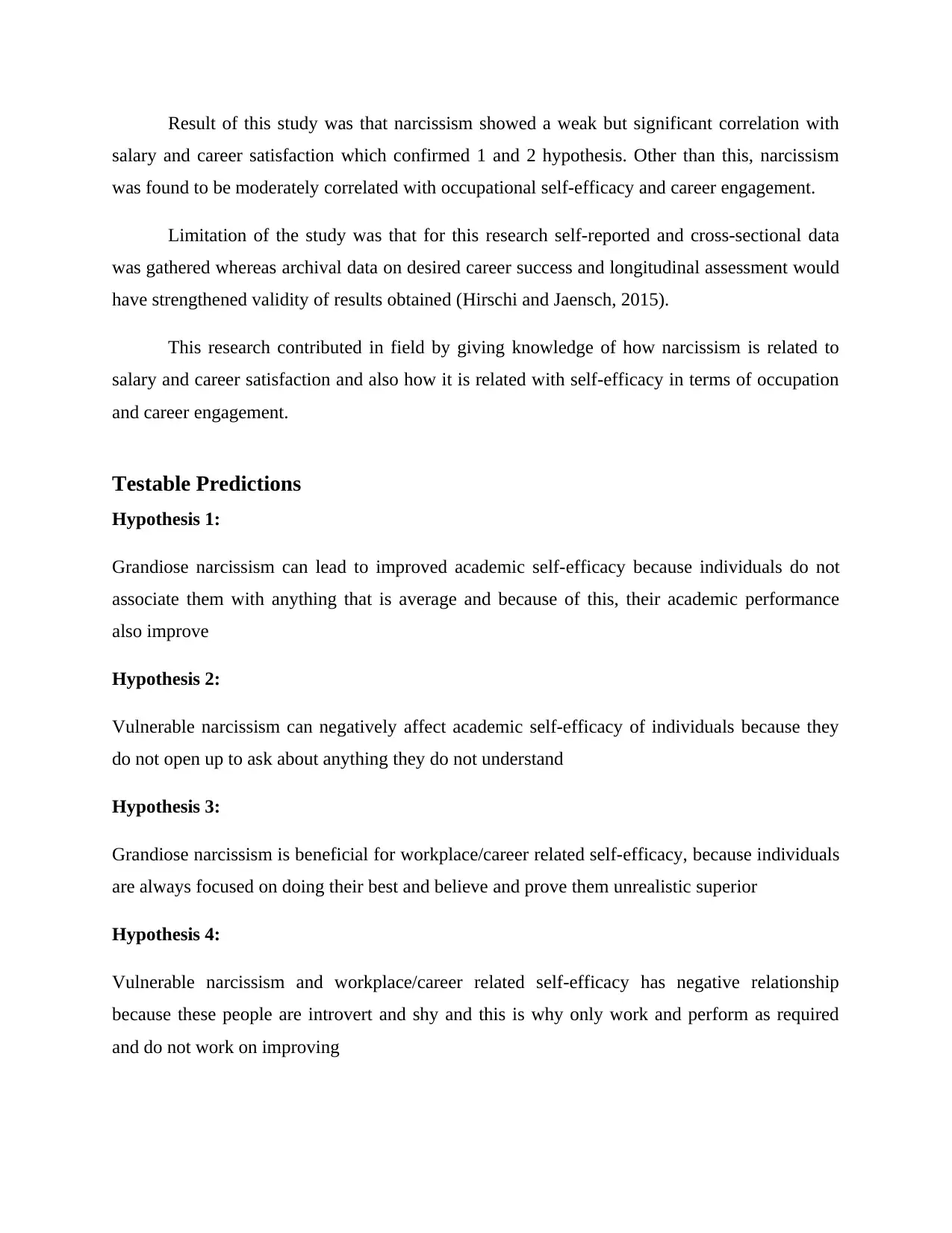
Result of this study was that narcissism showed a weak but significant correlation with
salary and career satisfaction which confirmed 1 and 2 hypothesis. Other than this, narcissism
was found to be moderately correlated with occupational self-efficacy and career engagement.
Limitation of the study was that for this research self-reported and cross-sectional data
was gathered whereas archival data on desired career success and longitudinal assessment would
have strengthened validity of results obtained (Hirschi and Jaensch, 2015).
This research contributed in field by giving knowledge of how narcissism is related to
salary and career satisfaction and also how it is related with self-efficacy in terms of occupation
and career engagement.
Testable Predictions
Hypothesis 1:
Grandiose narcissism can lead to improved academic self-efficacy because individuals do not
associate them with anything that is average and because of this, their academic performance
also improve
Hypothesis 2:
Vulnerable narcissism can negatively affect academic self-efficacy of individuals because they
do not open up to ask about anything they do not understand
Hypothesis 3:
Grandiose narcissism is beneficial for workplace/career related self-efficacy, because individuals
are always focused on doing their best and believe and prove them unrealistic superior
Hypothesis 4:
Vulnerable narcissism and workplace/career related self-efficacy has negative relationship
because these people are introvert and shy and this is why only work and perform as required
and do not work on improving
salary and career satisfaction which confirmed 1 and 2 hypothesis. Other than this, narcissism
was found to be moderately correlated with occupational self-efficacy and career engagement.
Limitation of the study was that for this research self-reported and cross-sectional data
was gathered whereas archival data on desired career success and longitudinal assessment would
have strengthened validity of results obtained (Hirschi and Jaensch, 2015).
This research contributed in field by giving knowledge of how narcissism is related to
salary and career satisfaction and also how it is related with self-efficacy in terms of occupation
and career engagement.
Testable Predictions
Hypothesis 1:
Grandiose narcissism can lead to improved academic self-efficacy because individuals do not
associate them with anything that is average and because of this, their academic performance
also improve
Hypothesis 2:
Vulnerable narcissism can negatively affect academic self-efficacy of individuals because they
do not open up to ask about anything they do not understand
Hypothesis 3:
Grandiose narcissism is beneficial for workplace/career related self-efficacy, because individuals
are always focused on doing their best and believe and prove them unrealistic superior
Hypothesis 4:
Vulnerable narcissism and workplace/career related self-efficacy has negative relationship
because these people are introvert and shy and this is why only work and perform as required
and do not work on improving
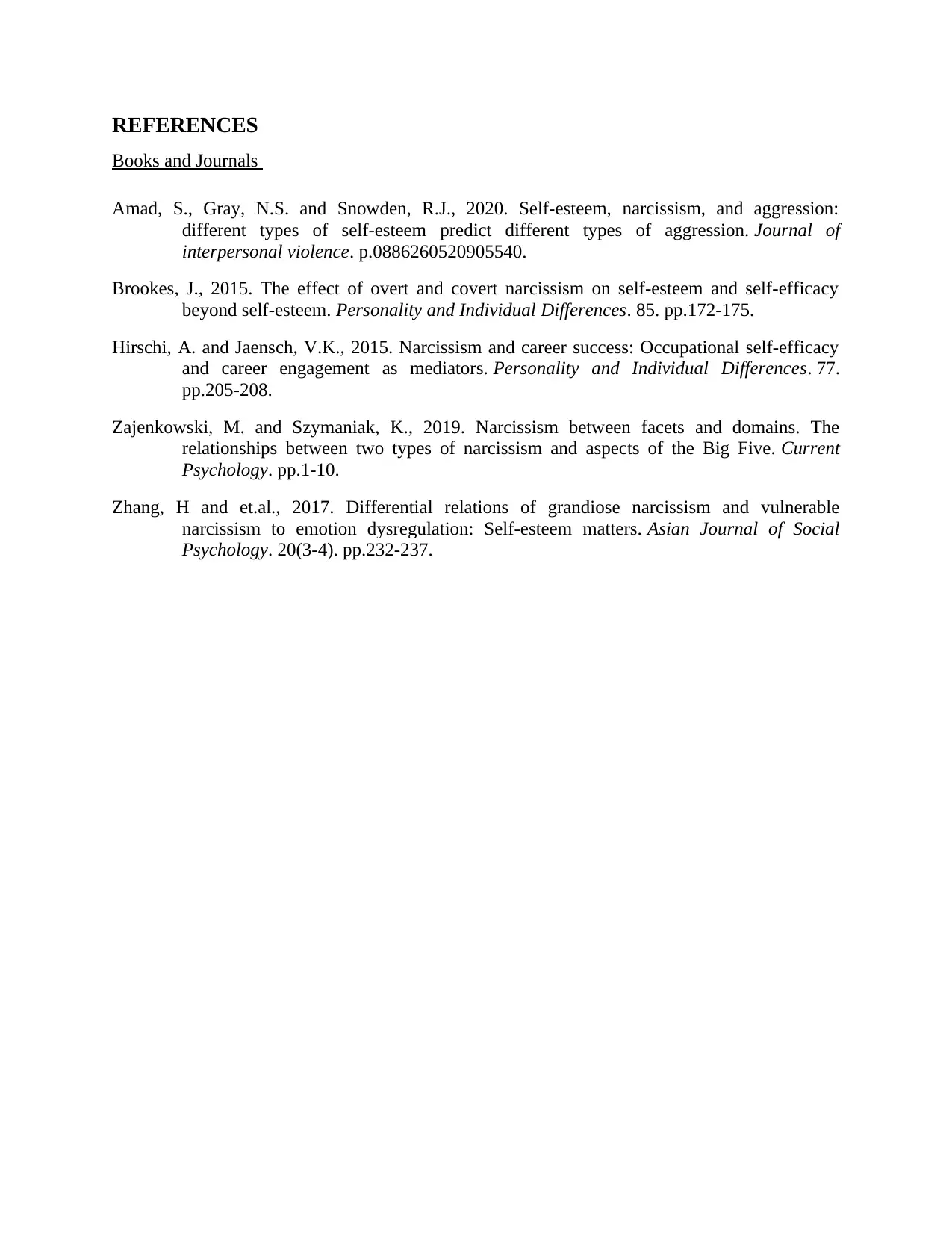
REFERENCES
Books and Journals
Amad, S., Gray, N.S. and Snowden, R.J., 2020. Self-esteem, narcissism, and aggression:
different types of self-esteem predict different types of aggression. Journal of
interpersonal violence. p.0886260520905540.
Brookes, J., 2015. The effect of overt and covert narcissism on self-esteem and self-efficacy
beyond self-esteem. Personality and Individual Differences. 85. pp.172-175.
Hirschi, A. and Jaensch, V.K., 2015. Narcissism and career success: Occupational self-efficacy
and career engagement as mediators. Personality and Individual Differences. 77.
pp.205-208.
Zajenkowski, M. and Szymaniak, K., 2019. Narcissism between facets and domains. The
relationships between two types of narcissism and aspects of the Big Five. Current
Psychology. pp.1-10.
Zhang, H and et.al., 2017. Differential relations of grandiose narcissism and vulnerable
narcissism to emotion dysregulation: Self‐esteem matters. Asian Journal of Social
Psychology. 20(3-4). pp.232-237.
Books and Journals
Amad, S., Gray, N.S. and Snowden, R.J., 2020. Self-esteem, narcissism, and aggression:
different types of self-esteem predict different types of aggression. Journal of
interpersonal violence. p.0886260520905540.
Brookes, J., 2015. The effect of overt and covert narcissism on self-esteem and self-efficacy
beyond self-esteem. Personality and Individual Differences. 85. pp.172-175.
Hirschi, A. and Jaensch, V.K., 2015. Narcissism and career success: Occupational self-efficacy
and career engagement as mediators. Personality and Individual Differences. 77.
pp.205-208.
Zajenkowski, M. and Szymaniak, K., 2019. Narcissism between facets and domains. The
relationships between two types of narcissism and aspects of the Big Five. Current
Psychology. pp.1-10.
Zhang, H and et.al., 2017. Differential relations of grandiose narcissism and vulnerable
narcissism to emotion dysregulation: Self‐esteem matters. Asian Journal of Social
Psychology. 20(3-4). pp.232-237.
1 out of 7
Related Documents
Your All-in-One AI-Powered Toolkit for Academic Success.
+13062052269
info@desklib.com
Available 24*7 on WhatsApp / Email
![[object Object]](/_next/static/media/star-bottom.7253800d.svg)
Unlock your academic potential
© 2024 | Zucol Services PVT LTD | All rights reserved.